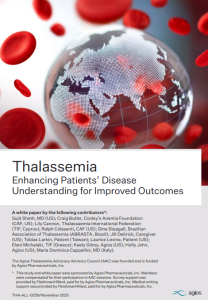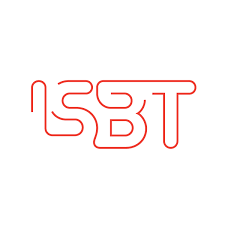Additional Resources
Compiled external resources with additional information from leading organisations on health and haemoglobin disorders-related topics.
 ‘Blood and Beyond’ is a multi-stakeholder initiative developed by Celgene, now part of Bristol Myers Squibb (BMS), involving experts from the fields of Haematology and Blood Management, Nursing, Patient Advocacy, and Health Economics.
‘Blood and Beyond’ is a multi-stakeholder initiative developed by Celgene, now part of Bristol Myers Squibb (BMS), involving experts from the fields of Haematology and Blood Management, Nursing, Patient Advocacy, and Health Economics.
Blood and Beyond’s overarching goal is to advocate for and help advance policies and practices that improve patient outcomes by supporting patient-centricity in anaemia prevention, diagnosis, and management thought patient blood management (PBM) and innovation.
Read the Article ”Blood Health Matters: Urging EU Policy Action on PBM Implementation” HERE
Report of the 2025 B&B Policy event in the European Parliament HERE
Read the 5-Point Plan for Better Blood Health in Europe HERE
View the Roadmap ”Towards Better Blood Health in Europe” HERE
View the Blood and Beyond Infographic HERE
 At the ASH 2025 Annual Meeting, Agios Pharmaceuticals launched a new white paper entitled “Thalassemia: Enhancing Patients’ Disease Understanding for Improved Outcomes,” developed in collaboration with its Thalassemia Advisory Council (AAC).
At the ASH 2025 Annual Meeting, Agios Pharmaceuticals launched a new white paper entitled “Thalassemia: Enhancing Patients’ Disease Understanding for Improved Outcomes,” developed in collaboration with its Thalassemia Advisory Council (AAC).
The white paper highlights the critical role of health literacy in strengthening disease understanding, supporting informed decision-making, and ultimately improving outcomes for people living with thalassemia.
Informed by insights from a global group of patients, caregivers, and healthcare professionals within the AAC, the publication aims to ensure that thalassemia initiatives are aligned with real-world needs and deliver meaningful value to the community.
Download the White Paper HERE
 The Coalition for Reducing Bureaucracy in Clinical Trials has released updated recommendations aimed at streamlining clinical research processes across Europe. These guidelines focus on reducing administrative burdens, enhancing patient safety, and ensuring the quality of clinical trials.
The Coalition for Reducing Bureaucracy in Clinical Trials has released updated recommendations aimed at streamlining clinical research processes across Europe. These guidelines focus on reducing administrative burdens, enhancing patient safety, and ensuring the quality of clinical trials.
Key Recommendations:
Simplification of Administrative Procedures: Streamlining documentation and approval processes to reduce delays.
Patient-Centered Approaches: Designing trials that prioritize patient safety and experience.
Harmonization Across Member States: Aligning regulatory requirements to facilitate multi-country trials.
These recommendations aim to make clinical trials more efficient and patient-friendly, thereby advancing medical research and treatment development.
Read the Full Publication HERE
 The International Society of Blood Transfusion (ISBT) is a global organization where transfusion medicine professionals from over 100 countries collaborate to enhance the safety of blood transfusion worldwide. ISBT promotes standardization and harmonization in the field of blood transfusion.
The International Society of Blood Transfusion (ISBT) is a global organization where transfusion medicine professionals from over 100 countries collaborate to enhance the safety of blood transfusion worldwide. ISBT promotes standardization and harmonization in the field of blood transfusion.
The Society provides a wide array of educational resources, such as guidelines, tools, publications, e-learning materials, and external links.
Visit the Official ISBT Page HERE
Sangamo Therapeutics creates genomic cures for patients suffering from severe diseases, including β-thalassaemia and SCD, for which today’s medicine can only offer symptom management at best.
The company has developed a series of useful resources for patients and families to help them learn more about novel discoveries in genomic medicine, clinical trials, etc.
Read the Leaflet ‘Understanding Genome Engineering – A Focus on Genome Editing’ EN/ESP
Read the Leaflet ‘Understanding Genome Engineering – A Focus on Henome Regulation’ EN/ESP
Read the Leaflet ‘Understanding the Importance of Shared Decisions’ EN
 This report describes the importance of systematically involving patients throughout a medicine’s life – from its early development through the regulatory process to ongoing monitoring and safe use in everyday healthcare.
This report describes the importance of systematically involving patients throughout a medicine’s life – from its early development through the regulatory process to ongoing monitoring and safe use in everyday healthcare.
It provides a comprehensive overview of the current knowledge about the benefits of patient involvement and existing initiatives, gives many examples and recommendations, and addresses the remaining challenges and practice gaps. The report will prompt readers to implement its best practice recommendations according to how well they fit in with their organisational and national needs.
The report combines the experience and expertise of the CIOMS Working Group XI on Patient involvement in the development, regulation and safe use of medicines.
Read the CIOMS Report HERE
 The European Medicines Agency (EMA) has endorsed two statements for healthcare professionals and the general publicabout the importance, safety and effectiveness of vaccines published by the International Coalition of Medicines Regulatory Authorities (ICMRA).
The European Medicines Agency (EMA) has endorsed two statements for healthcare professionals and the general publicabout the importance, safety and effectiveness of vaccines published by the International Coalition of Medicines Regulatory Authorities (ICMRA).
International regulators from different countries and regions have come together and jointly developed these statements to reassure healthcare professionals and the public around the globe that medicines regulatory authorities only allow vaccines onto the market that fulfill the highest standards for safety, efficacy, and quality.
In these statements, they also reiterate that it is everyone’s responsibility to get vaccinated in order to protect not only themselves but also their families, friends, communities, vulnerable populations who cannot get immunised as well as the generations to come.



